Does being at work feel like a prison sentence? Is it becoming increasingly difficult to perform your tasks and meet deadlines? Does your job feel like a heavy cloud hanging over you? If so, you may be experiencing the unspoken reality of work depression.
While most of us become burnt out from time to time due to the daily grind, work depression can be much severe and can seriously affect your career and life. Let us explore what is work depression, its signs, causes, and the profound impact it can have on mental health.
But most importantly, we will also learn about some valuable strategies to cope with depression in the workplace, enabling you to find a sense of balance and well-being in your professional life.
What is Work Depression?
Work depression refers to feeling emotionally drained, unmotivated and overwhelmed due to unsupportive or toxic work culture, repeated challenges or general dissatisfaction with one’s job.
So what is work depression? It is characterized by the presence of depressive symptoms experienced by employees that significantly affect their ability to function effectively in their job roles.
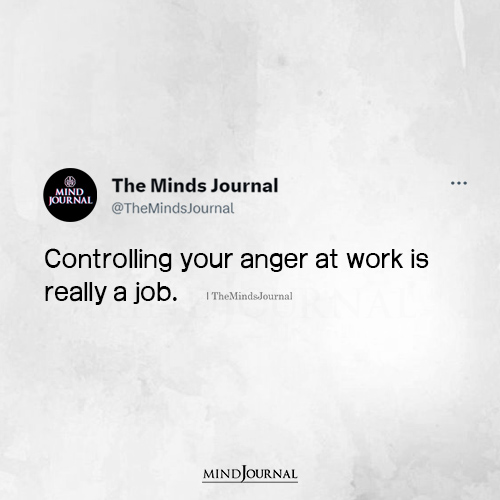
According to studies, “high-strain” jobs (high demands/low control) tend to be “most harmful” for the mental and emotional wellbeing of employees, while “active” jobs (high demand/high control) are considered as the “most healthful.” The researchers also found that work depression in employees makes them “vulnerable to adverse work outcomes”.
Related: Are You Feeling Depressed At Work? Is Your Job Making You Sick?
Further research has revealed that employees “who worked over 60 h (hours) had the highest prevalence of poorer mental health compared with individuals working ≤40 h (hours) per week.” There is no doubt that long working hours tend to have a serious negative impact on our psychological health.
Regardless, it is a common mental health challenge that can manifest in various ways, making it crucial to recognize and address. The researchers add “Importantly, having hobbies in their daily lives might help to mitigate the adverse effects of long working hours on workers’ depression and mental well-being.”
What Work Depression Feels Like
Does your job feel like a prison sentence? Do you feel crushed at the mere thought of going through another day of monotony, stress, or dissatisfaction with your job? That’s exactly what depression in the workplace feels like.
It’s the sinking feeling in your chest every time you step into the workplace. It’s the feeling of carrying a heavy weight on your shoulders as you struggle to finish your shift. It’s your desperate attempt at finding motivation and joy at work but failing once again.
Work depression can manifest as a persistent sense of fatigue, irritability, or hopelessness about your professional life. It’s feeling trapped in a cycle of negativity, where even small challenges seem insurmountable.
This type of depression can impact not only your work performance but also your overall well-being, affecting relationships, physical health, and self-esteem.
Whether it’s due to toxic work environments, overwhelming workload, or feeling undervalued, work depression takes a toll on both your mental and emotional health.
Becky’s Story
Becky is a bright and ambitious working woman who has unfortunately developed depression, thanks to her toxic workplace. The once vibrant and enthusiastic Becky now struggles to muster the energy to tackle her daily tasks.
Depression at work feels like an invisible force that drains the color from Becky’s world. It’s like wearing a mask, pretending everything is okay while battling a storm within. She experiences a persistent sadness, an overwhelming sense of hopelessness that clouds her thoughts, making even the simplest tasks feel like climbing a mountain.
As Becky’s depression intensifies, she retreats into herself, seeking solace in isolation. The once collaborative and dynamic team she was part of now feels like an impenetrable fortress.
Related: My Job Is Too Stressful: Are You Suffering From Shit Job Stress Disorder (SJSD)?
But depression doesn’t confine itself to the boundaries of Becky’s mind. It seeps into her physical being, manifesting as unexplained headaches, fatigue that no amount of coffee can fix, and aches and pains that have no apparent cause.
Work depression is an emotional rollercoaster, with highs that feel few and far between, and lows that threaten to consume her. Negative thoughts and self-doubt become constant companions, eroding her self-esteem and leaving her questioning her worth.
The cognitive toll of depression is evident in Becky’s work performance. Her memory starts slipping through the cracks. Concentration becomes a distant memory, and decision-making becomes an arduous task, clouded by self-doubt and a lack of confidence.
Interpersonal relationships suffer as social withdrawal and irritability create barriers to effective communication.
But there is hope. Becky, like many others facing depression in the workplace, can find ways to cope and navigate through the shadows. Depression in the workplace is a battle that shouldn’t be fought alone. It requires understanding, empathy, and support from both individuals and organizations.
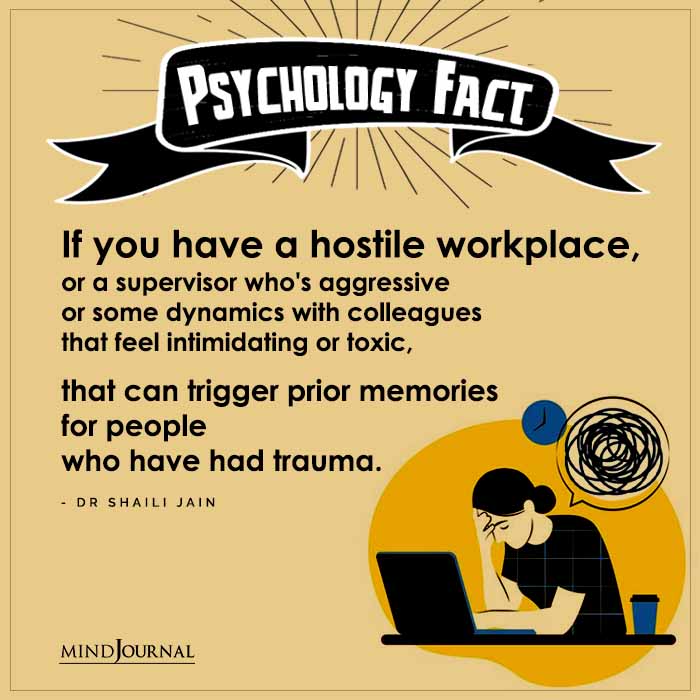
By shedding light on this often overlooked issue, we can empower individuals like Becky to find their strength, reclaim their joy, and thrive in both their personal and professional lives.
Now that we have a fair idea of what is work depression, let’s focus on how we can identify the symptoms of this condition. Recognizing the signs and seeking support are crucial steps toward finding relief and reclaiming a sense of fulfillment in your professional life.
Signs of Work Depression You Should KNow About
Are you suffering from work depression? If you are unsure, here are some of the most obvious signs of work depression that you should be aware of –
1. Persistent Sadness and Lack of Energy
Employees experiencing depression often exhibit a prolonged state of sadness, hopelessness, and low energy levels. They may struggle with even the simplest tasks and find it challenging to concentrate or make decisions. This is one of the major signs of work depression.
Related: Feeling Miserable At Work? 10 Tips On How To Cope In A Job You Hate And Protect Your Mental Health
2. Decreased Productivity
Depression can lead to a decline in work performance, characterized by missed deadlines, increased errors, and a general decline in productivity. Motivation and enthusiasm for work may wane, resulting in a lack of drive and effort.
3. Withdrawal and Isolation
Individuals with depression may withdraw from social interactions, preferring solitude and avoiding team collaborations. They may become disengaged from colleagues, leading to strained relationships and a decline in team dynamics. This is also among the basic signs of work depression.
4. Physical Symptoms
Depression can manifest in physical symptoms, such as headaches, fatigue, sleep disturbances, and unexplained aches and pains. These symptoms can further contribute to reduced productivity and overall well-being.
What Causes Depression in the Workplace?
Ever found yourself dreading Mondays or feeling drained by your job? Let’s dive into the various triggers of work depression –
1. High Stress Levels
Demanding work environments, excessive workload, tight deadlines, and unrealistic expectations can contribute to chronic stress, which may trigger or exacerbate depression.
2. Poor Workplace Support
A lack of support from supervisors and colleagues, limited access to mental health resources, and a culture that stigmatizes mental health concerns can all contribute to feelings of isolation and exacerbate depressive symptoms.
3. Lack of Work-Life Balance
When work demands encroach upon personal life, leaving little time for rest, relaxation, and meaningful connections, individuals may experience increased stress and a higher risk of developing depression.
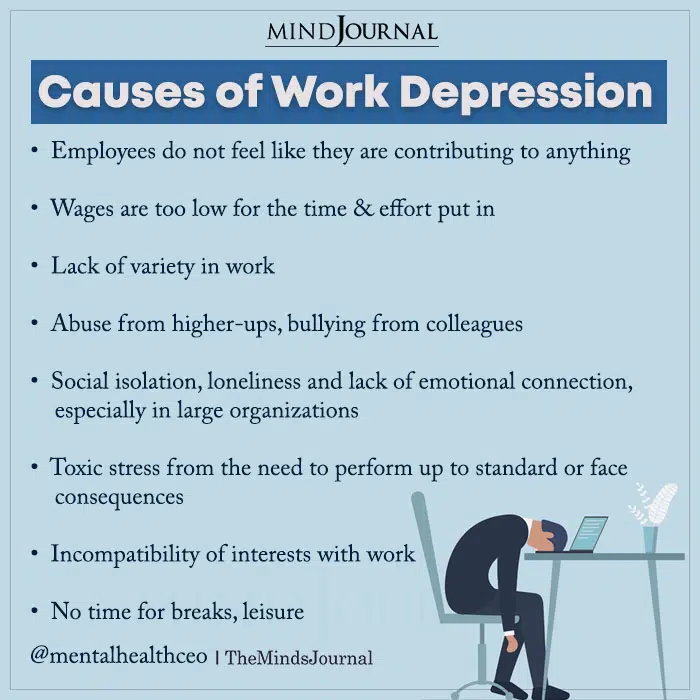
4. Job Insecurity
Fear of job loss or uncertainty about future career prospects can cause significant anxiety and stress, leading to the development of depression.
Related: Why Am I So Exhausted After Work? 8 Reasons For After-Work Exhaustion And What To Do
How Work Depression Impacts Your Mental Health
Depression in the workplace is not merely a temporary bout of sadness; it can have a long-term and profound impact on an individual’s mental health and overall well-being.
1. Emotional Toll
Depression can amplify feelings of despair, hopelessness, and self-doubt. Persistent negative thoughts and emotions can chip away at an individual’s self-esteem and erode their sense of purpose and satisfaction.
2. Impaired Cognitive Function
Depression can impair cognitive functions such as memory, concentration, and decision-making abilities. This can hinder problem-solving skills and hinder creativity, ultimately affecting job performance.
3. Interpersonal Challenges
Depression can strain relationships with colleagues, friends, and family members. Social withdrawal and irritability can create barriers to effective communication and collaboration, leading to increased feelings of isolation.
Related: Taking Control Of Your Workday: 13 Tips For Setting Boundaries At Work
How to Cope with Depression in the Workplace
Battling the blues at your desk? Now sure how to stop feeling overwhelmed by work stress? Here are some highly effective and helpful coping strategies for work depression to restore balance and well-being amidst professional challenges –
1. Seek Professional Help
Consulting with a mental health professional, such as a therapist or counselor, can provide valuable support and guidance in managing depression. They can help develop coping strategies and provide a safe space to express thoughts and emotions.
2. Build a Support Network
Reach out to trusted colleagues, friends, or family members who can offer understanding and support. Sharing experiences and challenges can help alleviate feelings of isolation and provide a sense of belonging.
3. Practice Self-Care
Prioritize self-care activities that nourish your mind, body, and spirit. Engage in regular exercise, maintain a balanced diet, get sufficient sleep, and engage in activities that bring you joy and relaxation.
4. Create Boundaries
Establish clear boundaries between work and personal life. Set realistic goals and learn to say no when necessary. Taking breaks and engaging in activities outside of work can help recharge and rejuvenate.
5. Seek Workplace Support
If possible, reach out to human resources or management to explore available workplace support systems. Some organizations offer employee assistance programs (EAPs) or resources dedicated to mental health and well-being.
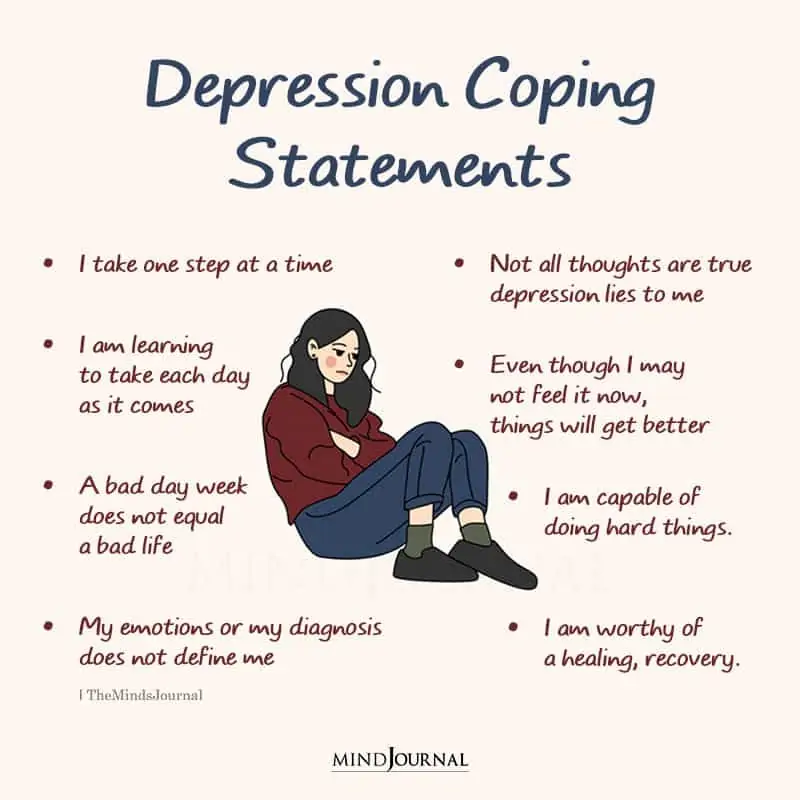
Takeaway
Work depression is a complex issue that demands attention and understanding. By recognizing the signs, understanding the causes, and implementing coping strategies, individuals can navigate the challenges posed by depression and cultivate a healthier work environment.
Remember, seeking help is not a sign of weakness but a courageous step toward self-care and well-being. Let us work together to foster workplaces that prioritize mental health, compassion, and support, paving the way for happier, healthier, and more productive professionals.
Related: 35+ Tips On How To Have Fun At Work While Staying Productive
Frequently Asked Questions (FAQs):
Does work depression exist?
Yes, work depression is real, manifesting as feelings of overwhelm, fatigue, and dissatisfaction due to job-related stressors or challenges.
What to do when you can’t cope with work?
When struggling to cope at work, seek support from trusted colleagues, supervisors, or mental health professionals for guidance and assistance.
Is depression a valid reason to miss work?
Yes, depression is a valid reason to miss work, as it can significantly impact one’s ability to function effectively and safely.
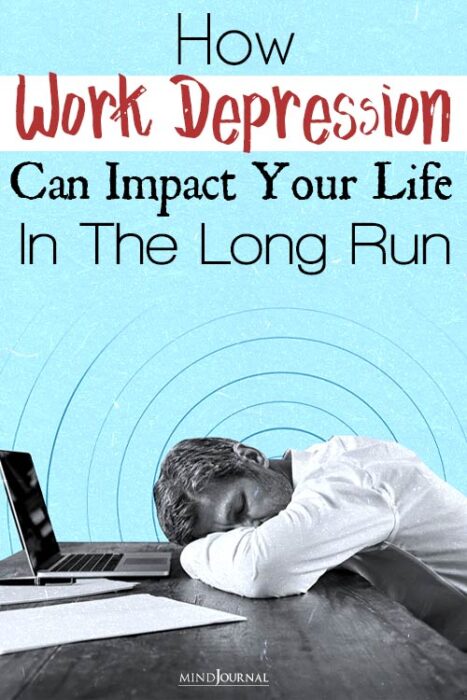
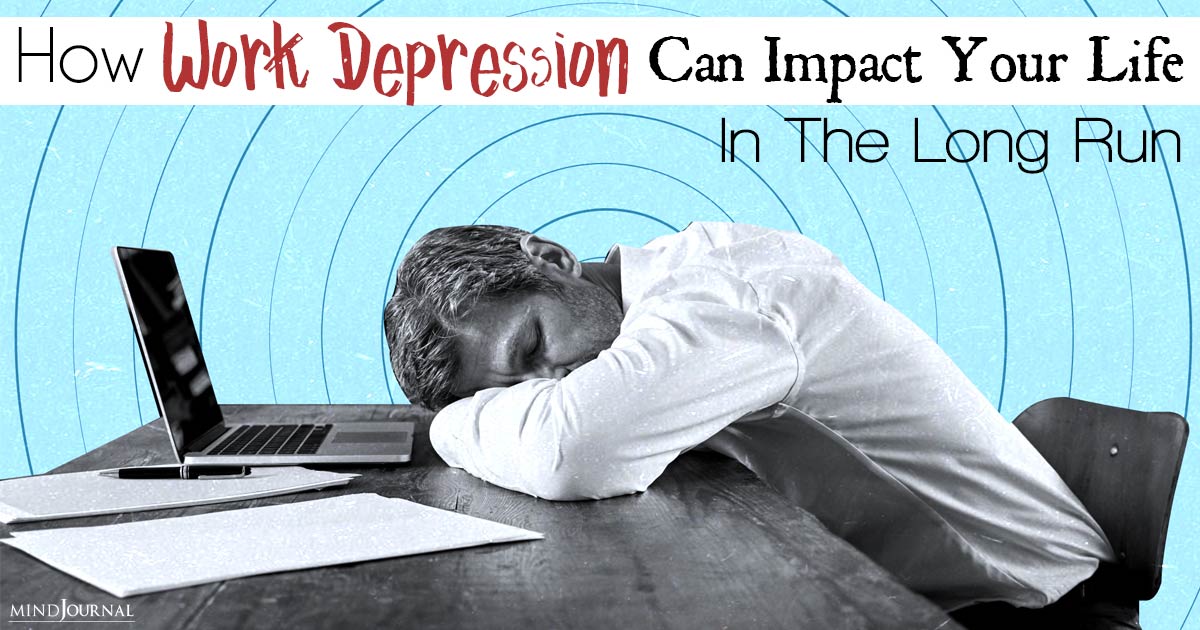





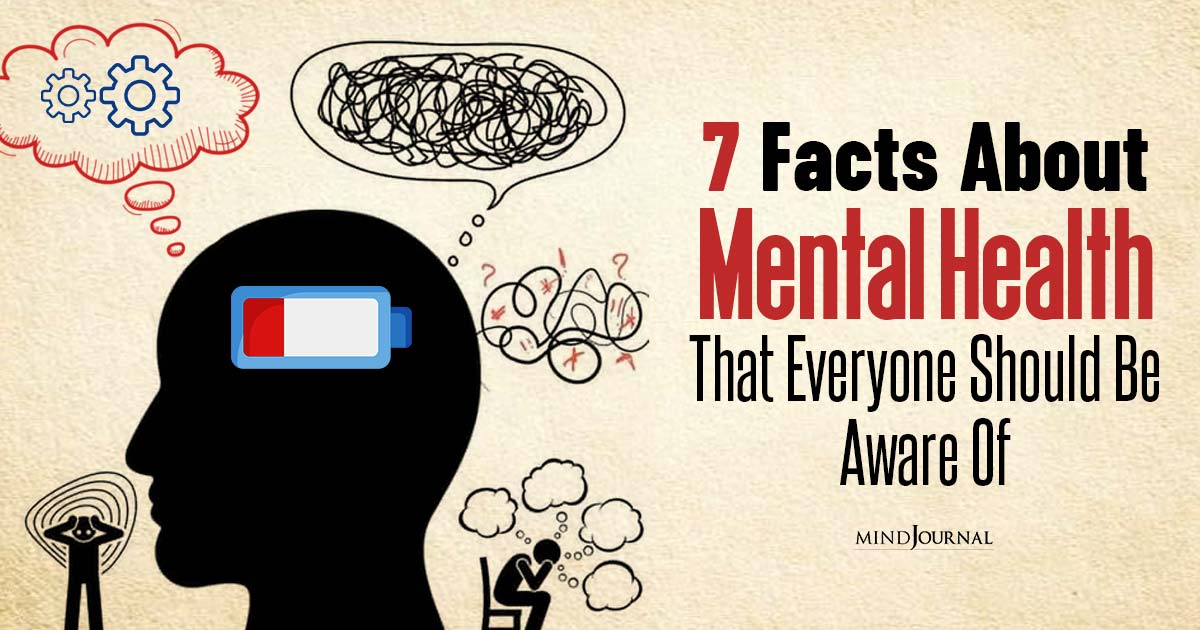

Leave a Reply
You must be logged in to post a comment.